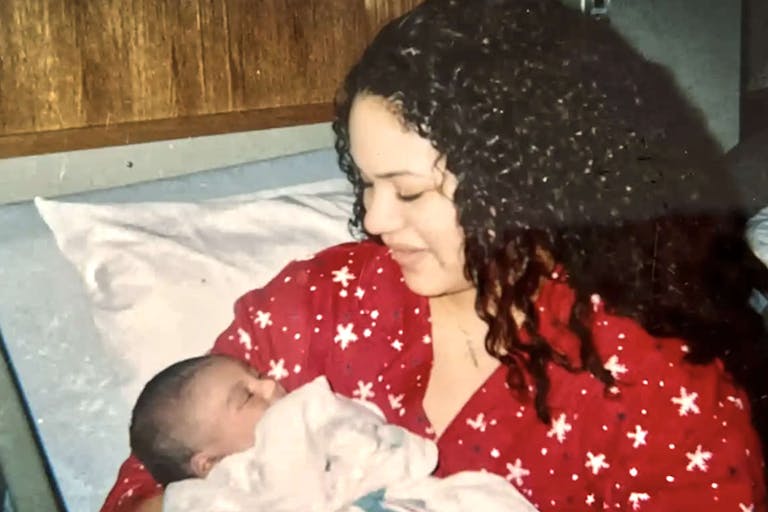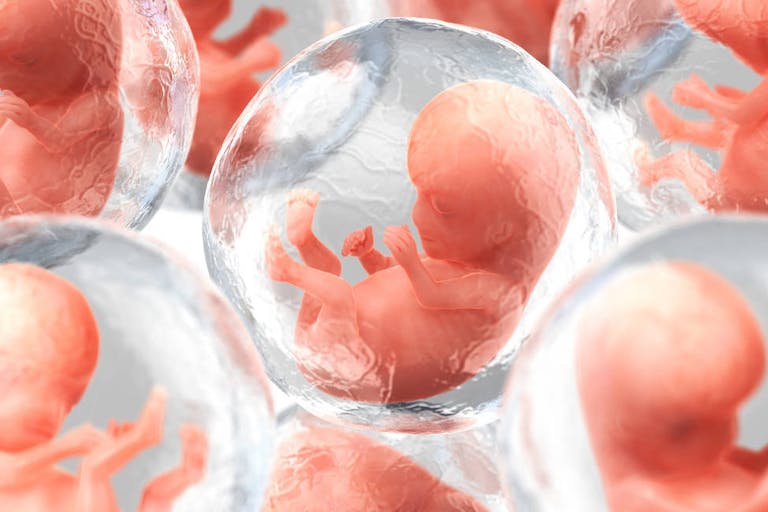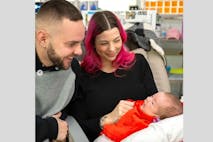
She chose life for her children, no matter what the future might hold
Melina Nicole
·
Human Interest·By Nancy Flanders
The disturbing results of regarding ‘extra’ embryos as ‘property, not people’
The fertility industry is a billion-dollar industry which many consider to be predatory, profiting off of the emotions of adults who want to be parents but have been unable to conceive naturally. Now, to avoid the heavy financial toll of IVF, some couples are turning to social media — where other couples are ‘transferring ownership’ of their children to strangers.
Embryo adoption
Embryo adoption has risen in popularity in the United States due to a major ethical concern in the booming fertility industry: so-called ‘extra’ embryos.
In the U.S., the annual donated embryo transfer rate more than tripled from 2004 to 2019, with 8,457 births resulting from embryo adoption during that time frame. However, the couples who create embryos often make more than they are willing to carry to term and raise. Paris Hilton, for example, appears to have dozens of frozen children.
The practice of adopting embryos has become popular among Christians who view it as a life-saving act towards these perpetually frozen humans. Dr. Paul and Susan Lim adopted an embryo because IVF was not an option for them — as it isn’t for many Christians who know life begins at fertilization. Dr. Lim called it a “rescue operation.” He explained to The New York Times, “These children are being abandoned in a frozen state. If they don’t get adopted, they’re dead.”
Yet, some who choose IVF and want to ‘donate’ their embryos — their children — to another couple don’t necessarily like the way most embryo adoption agencies operate, including that they likely screen potential parents the way that traditional adoption agencies do.
Snowflakes, for example, screens for criminal history and child abuse records and educates the parents on how to parent an adopted child. Some organizations do not allow the embryos to be ‘adopted’ by a couple who plans to use a surrogate, and will only allow male and female couples, who have been married for at least three years, to ‘adopt.’
But embryo ‘adoption’ is actually considered the transfer of ownership. This is different from adoption, and in some cases this language changes the way these tiny human beings are treated.
Giving babies away on the internet
The rules of embryo adoption organizations were an issue for Emily, who created embryos with a sperm donor and is raising them with her wife. They are raising two children and decided they didn’t want the other embryos they created. Emily decided to offer the embryos up on Facebook and found a gay couple who was seeking out embryos.
“I wanted to donate them to another queer couple,” Emily told The Philadelphia Inquirer. She and her wife met with the fertility clinic and lawyers, and legally “transferred ownership” of the embryos to the gay couple from Facebook.
Likewise, another couple, Ryann Hendrickson and her husband, “transferred ownership” of their embryos to a woman who was looking for embryos. She said she felt a connection immediately because they were both breast cancer survivors.
The ‘transferring of ownership’ isn’t just how The Philadelphia Inquirer refers to the adoption of an embryo. That’s what it legally is.
The Embryo Adoption Awareness Center explains it this way (emphasis added): “Just to be very clear and transparent on all levels, in the U.S. embryo adoption is not considered a legal form of adoption because embryos are considered property, not people. Therefore, the process is governed by property contract law, not by adoption law. We are applying the best practices of adoption to the whole process, but adoption law does not apply.”
An erroneous understanding of when life begins has opened the door for this unethical treatment of human embryos. No human being can be owned by another human being — not in the United States. Yet that is how these children are being treated — stripped of their humanity and their dignity and sometimes simply given away like old furniture.
The well-being of the children
It is unclear if either Emily or Ryann ran background checks on any of the prospective parents to whom they gave their children. And none of them seemed to consider how the children would feel about it in the future.
But individuals who have been created using artificial reproductive technologies (ART) can offer us a glimpse of how these children — given away on social media — may someday feel.
“Somehow, somewhere, my parents developed the idea that they deserved to have a baby, and it didn’t matter how much it cost, how many times it took, or how many died in the process,” a woman conceived through ART told the organization Them Before Us. “They deserved a child. And with an attitude like that, by the time I was born they thought they deserved to have the perfect child… as Dad defined a perfect child. And since they deserved a child, I was their property to be controlled, not a person or a gift to be treasured.”
One man, born through traditional surrogacy, explained, “Something horrible happened to us at birth. We lost our mothers. They did not die, but they might as well have been dead because we lost them in the capacity of mother, and to a tiny baby, that feels like death… That makes us feel very rejected. That leaves a hole in our hearts whether we admit to it or it manifests some other way like in depression or a fear of getting close to someone else… ”
And a woman raised by a gay couple explained, “I felt the loss. I felt the hole. As I grew, I tried to fill that hole with aunts, my dads’ lesbian friends, and teachers. I remember asking my first grade teacher if I could call her ‘mom.’ I asked that question of any woman who showed me any amount of love and affection. It was instinctive. I craved a mother’s love even though I was well loved by my two gay dads.”
Furthermore, research from a Harvard Medical School study informs us that a whopping 62% of children conceived through donor technologies, like surrogacy and IVF, consider ART to be immoral and unethical.
As one girl explained, “It bothers me that I cost money, that the one woman I want most in this life is a stranger yet 50% of me. Sometimes I wish I weren’t born. I didn’t ask for this, and I never would have consented to it.”

Live Action News is pro-life news and commentary from a pro-life perspective.
Contact editor@liveaction.org for questions, corrections, or if you are seeking permission to reprint any Live Action News content.
Guest Articles: To submit a guest article to Live Action News, email editor@liveaction.org with an attached Word document of 800-1000 words. Please also attach any photos relevant to your submission if applicable. If your submission is accepted for publication, you will be notified within three weeks. Guest articles are not compensated (see our Open License Agreement). Thank you for your interest in Live Action News!

Melina Nicole
·
Guest Column
Melina Nicole
·
Human Interest
Bridget Sielicki
·
Human Interest
Nancy Flanders
·
Human Interest
Isabella Childs
·
Human Interest
Bridget Sielicki
·
Politics
Nancy Flanders
·
Pop Culture
Nancy Flanders
·
Politics
Nancy Flanders
·
Politics
Nancy Flanders
·
Abortion Pill
Nancy Flanders
·